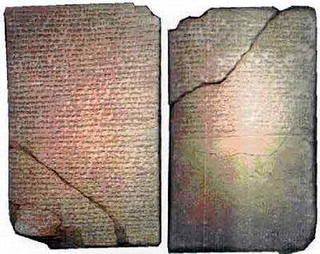Tell the Department of Justice to prevent ancient Persian Artifacts from being sold!

A legal battle over the seizure of ancient Persian artifacts is underway between victims of a 1997 bombing in Jerusalem and the University of Chicago, the Oriental Institute, and the Iranian government. At stake is an extremely valuable collection of ancient Persian tablets from Persepolis – an integral part of Iran’s heritage – that the bombing victims wish to seize and auction off as compensation for physical and mental damages incurred from the bombings. (For more backround on the Chicago Persian heritage crisis click here)
It is imperative that the Department of Justice intervenes and prevents the seizure of these valuable relics.
Click here to send a letter to Peter Keisler, Assistant Attorney General for the Civil Division at the Department of Justice, as well as to Attorney General Alberto Gonzales urging them to prevent the seizure.
As political tensions have risen between the United States and Iran, the case has begun to receive international headlines. Manouchehr Mottaki, the Foreign Minister of Iran has threatened to cancel proposed negotiations with the US while Hamid Reza Asefi, the Iranian Foreign Ministry Spokesman, has called on the US to show a quick and serious reaction to the case.
Meanwhile, Iran has called for the United Nations and the United Nations Educational, Scientific, and Cultural Organization (UNESCO) to intervene citing what it feels is a violation of several international conventions protecting a nation’s cultural history.
The case has also managed to fuse strange bedfellows as even the United States Justice Department has, on several occasions, expressed interest in the case. Fearful of the dangerous precedent the case could set to allow American assets abroad to be seized, the US Justice Department has submitted a brief arguing against the Illinois Court’s ruling.
Discovered in Persepolis in 1933 and lent to the University of Chicago’s Oriental Institute for research, these 2,500 year old clay tablets contain invaluable and detailed information about the culture of the people of the Persian Empire. The Achaemenid (or Persepolis) clay tablets were loaned to the University of Chicago in 1937. They were discovered by archaeologists in 1933 and are legally the property of the National Museum of Iran and the Iran's Cultural Heritage Organization. The artifacts came with the understanding that they would be returned to Iran. The tablets, from Persepolis, the capital of the Persian Empire, date to about 500 B.C.
The tablets give a view of daily life, with things like daily rations of barley that were given to workers in nearby regions of the empire. These tablets were sent to the capital to keep track of how they were paying workers. Gil Stein, director of the Oriental Institute at the University of Chicago, said that details largely concern food for people on diplomatic or military missions. Each tablet is about half the size of a deck of Playing cards and has characters of a dialect of Elamite, an extinct language understood by perhaps a dozen scholars in the world.
Stein called it "the first chance to hear the Persians speaking of their own empire." Charles Jones, Research Associate and Librarian at the Oriental Institute and tablet expert compared them to "credit card receipts." Most of our current knowledge about the ancient Persian empire comes from comes from the accounts of others, most famously the Greek storyteller Herodotus. Stein added, "It's valuable because it's a group of tablets, thousands of them from the same archive. It's like the same filing cabinet. They're very, very valuable scientifically."
The university's Oriental Institute had been returning them to Iran in small batches. The Institute had already returned 37,000 tablets and fragments to Iran and were preparing another shipment when Strachman intervened. Gil Stein, director of the Oriental Institute at the University of Chicago said, "The Iranians are understandably furious about this. You'd have to imagine how we would feel if we loaned the Liberty Bell to Russia and a Russian court put it up for auction."
The dispute at question arose on September 4, 1997, when explosive devices set off in Jerusalem by members of Hamas wounded 200 individuals, including five Americans who have now decided to sue the Iranian government for their alleged role in sponsoring the attack.
The United States District Court in Illinois ruled in September of 2003 that the victims of the bombings had established their right to seek relief and awarded them damages of $423.5 million. Citing their mistrust of the US legal system, an Iranian representative was notably absent in the proceedings which US district Judge Ricardo Urbina cited as a critical reason for his default judgment against Iran.
Since then, David J. Strachman, a Rhode Island lawyer, has asked the Federal Court to confiscate and auction off Iran’s assets in the US, including the aforementioned artifacts to compensate the victims.
The decision has since been appealed and challenged by lawyers defending the University of Chicago and Iran on several grounds which include the invocation of a “sovereign immunity” principle that notes that governments cannot be sued like ordinary citizens.
This argument was denied by Judge Blanche M. Manning in a hearing last month, as she rejected the University of Chicago’s attempts at asserting immunity on Iran’s behalf. After denying the validity of Iran’s claim that it faces “numerous practical barriers” to receiving a fair trial, Judge Blanche confirmed an earlier Court’s decision that only Iran could assert its right to immunity.
Persistent in their defense of Iran, the University of Chicago plans on appealing the decision by August 21st as the case is scheduled to move up to the 7th circuit court. Iran, meanwhile, has filed for a special appearance in the hearing next month which has added a new dimension to this entangled legal dispute.
The university had argued sovereign immunity, i.e, under federal law, "certain property owned by foreign governments is protected from court judgments. HOWEVER, there is a law in effect that states that is if a nation is a blantent sponser or advocate of terrorism, the assets of that nation may be repossesed internationally without reperation. This situation is a reality, and there is a very unclear, dark cloud, howevering over it. We cannot let this happen, we MUST not let this happen. The situation is totally unacceptable.
These are the few remnants of our granduer ancient and noble heritage! Do not let envious foes once again loot what little is left of our history! These artifacts are PRICELESS and due to the lack of recording in our history, are the few artifacts documented by Persians themselves and not Westerners, describing ancient life in the old empire. It is vital that these artifacts be protected, preserved, and kept in the hands of the Iranian nation, not sold to lucky Western entrepenuers on the black market for millions of dollars who'd like to add a nice "Persian piece" to their dining room.
Compelling the Justice Department to file a brief in support of Chicago University is an initial step in this campaign, and it is vital that we make as much noise about this as possible. So make noise, send letters, spread the word, if the courts and juries and lawmakers see there is an an outcry coming from the Persian community against such evilness, then it is much harder for them to grant the case to the plantiffs. It is absurb that an entire nation and culture has to suffer for the loss of 4 families. They want to strip us of our 2,500 year heritage, because some assholes that had nothing to do with us or our heritage, attacked them. This is absolutely absurd and backward, and I for one will not stand for it.
Click here to send a letter to Peter Keisler, Assistant Attorney General for the Civil Division at the Department of Justice, as well as to Attorney General Alberto Gonzales urging them to prevent the seizure.
Payandeh Bad Khake Iran Ma!
Labels: artificats, chicago persian heritage crisis, IRAN, iranian, persian empire










0 Comments:
Post a Comment
<< Home